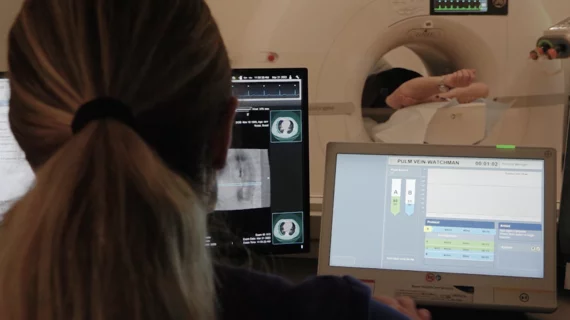Cardiac CT outperforms stress tests when screening liver transplant candidates for CAD
Screening liver transplant (LT) patients for signs of coronary artery disease (CAD) is more effective with coronary CT angiography (CCTA) than a stress test, according to new data published in The American Journal of Cardiology.[1]
“Cardiac complications are now the leading cause of morbidity and mortality in LT recipients, accounting for 40% of all deaths within 30 days after LT,” wrote corresponding author Prabhjot S. Nijjar, MD, a cardiologist with the University of Minnesota Medical School, and colleagues. “As such, accurate cardiovascular disease risk estimation of LT candidates is of utmost importance to improve outcomes and resource allocation.”
Changes in CAD screening over time
It was routine practice for many years to use stress testing to exclude significant CAD in LT candidates. Because of the many limitations associated with this technique, however, it was always associated with lower accuracy.
When the American Heart Association (AHA) and American College of Cardiology collaborated on new chest pain guidelines in 2021, the groups gave CCTA a Class 1 recommendation for evaluating patients for CAD. The AHA went one step further in 2022, specifically advocating for the use of CCTA when screening patients for a potential liver transplant.
Tracking screening results in liver transplant candidates
With this latest analysis, Nijjar et al. explored the use of CCTA and stress tests among LT candidates who underwent screening from 2020 to 2023. All data came from a tertiary-level LT center in the United States. The mean age was 55.8 years old, 59% of patients were men and 83.4% were white. While 141 patients underwent dobutamine stress echocardiography (DSE), another 269 patients underwent a CCTA exam.
Overall, new CAD was diagnosed in 58.7% of CCTA patients and 3.5% of DSE patients. Clinically actionable CAD—defined as a coronary artery calcium score greater than 100—was present in 35.7% of CCTA patients. Also, 12.8% of stress tests were non-diagnostic or inconclusive compared to 2.2% of CCTAs.
In addition, the group noted that older patients and men were linked to a higher likelihood of presenting with signs of CAD on CCTA results. Patients with a history of diabetes, hypertension, dyslipidemia, a higher atherosclerotic cardiovascular disease (ASCVD) score and a larger number of CAD risk factors also faced a higher risk of CAD on CCTA.
“This provides a vast opportunity for optimizing cardiovascular disease care in LT candidates and recipients,” the authors wrote. “Future studies should assess the impact of CAD testing on cardiac outcomes after LT.”
Click here to read the full analysis in The American Journal of Cardiology.
Medicare payments for CCTA may soon be changing
The U.S. Centers for Medicare and Medicaid Services (CMS) floated the idea of increasing Medicare reimbursements for CCTA in its recently released 2025 Medicare Hospital Outpatient Prospective Payment System (HOPPS) proposed rule. If this change, supported by a number of U.S. cardiology societies, goes into place, it may it even easier for care teams to screen LT candidates with a CCTA exam.

